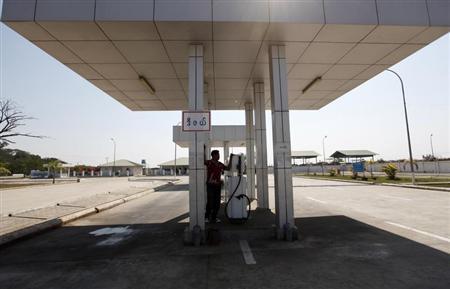Many countries badly mismanage oil, mining resources: study
Date: 16-May-13
Country: USA
Author: Valerie Volcovici

A man waits for customers at a petrol station in Naypyitaw January
27, 2012.
Photo: Soe Zeya Tun
More than 80 percent of the world's major oil and gas-producing and mining countries fail to meet "satisfactory standards" for managing their natural resources, according to a report tracking global resource mismanagement and corruption.
New York-based Revenue Watch Institute released its first Resource Governance Index on Wednesday, which scores and ranks 58 countries according to the level of transparency and accountability in their oil, gas and mining sectors.
The index, which is to be released annually from this year, is designed to help commodity-rich countries avoid the so-called "resource curse," when their promising economies grow only slowly because of poor institutional oversight.
"The lives of over a billion citizens could be transformed if their governments managed their oil, gas and minerals in a more open, accountable manner," Revenue Watch said.
The index scores countries on a scale of 1 to 100, with Norway ranking as the top performer on governance with 98, followed by the United States at 92. Myanmar was lowest with a score of 4, just below Turkmenistan.
Countries are judged on four factors: legal framework, transparency levels, government checks and balances, and governance. Only 11 of the 58 countries scored above the "satisfactory" score of 70, according to the group.
"More than half the sample, 32 countries, do not meet even basic standards of resource governance, performing weakly or even failing," the report said.
The worst performing countries on the index also rely almost exclusively on natural resources as their main source of income, according to Revenue Watch, adding that if their governments improved the way they manage these resources, it would make a significant difference in their economic development.
The index cited as an example Nigeria, whose oil revenues were 60 percent higher than total international aid to sub-Saharan Africa in 2011.
Revenue Watch also highlights Saudi Arabia and Afghanistan, placing them 48th and 49th in the rankings.
Even highly-ranked countries did not escape criticism.
"Countries like Canada, the U.S. and Australia also need to ensure their multinational companies do not facilitate the opacity found in many countries where they operate," said Daniel Kaufmann, president of Revenue Watch.
Kaufmann said in an interview said that measures in these and other countries to ensure transparency in contracts will be crucial for improving resource governance in resource-rich countries.
He pointed to a section of the 2010 U.S. Dodd-Frank Act that requires companies registered with regulators to publicly report how much they pay governments for access to oil, gas and minerals. That enables investors to assess risk.
A federal court last month declined to hear a challenge by the U.S. trade groups to the measure and referred the case to a lower court.
Kaufmann said the impact of the U.S. provision will be global.
"It will affect all the multinational companies listed in the U.S.," he said, and while will not result in immediate full transparency abroad, in three to five years it might turn out to be a "game changer."
(Reporting by Valerie Volcovici; Editing by Richard Pullin and Steve Orlofsky)
![]()
© Thomson Reuters 2013 All rights reserved